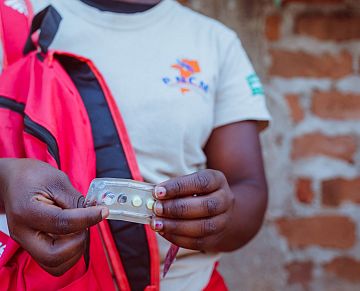WHO issue new guidelines on seasonal malaria chemoprevention implementation – our response
8 June 2022
On 3 June 2022, the World Health Organization (WHO) issued new malaria chemoprevention guidelines. While previous WHO policy recommendations provided specific guidance on how chemoprevention interventions should be implemented, the new guidelines give more flexibility to malaria-endemic countries to adapt chemoprevention strategies to the local context.
Malaria Consortium welcomes these new guidelines and believes that a shift towards greater flexibility and an emphasis on local evidence has the potential to significantly boost the fight against malaria. However, there remains a need for globally agreed and accepted frameworks to guide the safe, effective and sustainable deployment of the various chemoprevention tools across the African continent.
This has particular relevance to the issue of drug resistance, which requires a coordinated approach across national borders. There are varying levels of resistance to sulfadoxine and pyrimethamine (SP), the drugs used for seasonal malaria chemoprevention (SMC) and intermittent preventative treatment in pregnancy (IPTp), across the continent and changes to the deployment of any intervention should be considered within a global decision-making framework.
Malaria Consortium’s work on chemoprevention includes our seasonal malaria chemoprevention portfolio reaching over 20 million children in Burkina Faso, Chad, Nigeria, Mozambique, Togo and Uganda in 2021, and work on the intermittent preventative treatment in infants (IPTi) in Nigeria and IPTp in Uganda.
Craig Bonnington, Malaria Consortium’s Senior Technical Advisor for SMC said; “Transmission, drug resistance profile, immunity and first-line curative drugs vary significantly in countries where malaria chemoprevention takes place or countries that are considering new chemoprevention strategies. The interplay of these variables will influence drug choice, drug efficacy, current and future effectiveness as well as safety and logistical feasibility.”
Christian Rassi, Malaria Consortium’s SMC Programme Director said; “In order to ensure a safe and responsible deployment of effective seasonal malaria chemoprevention, particularly in new geographies, countries will require mechanisms to decide how and when to deploy SMC optimally, and Malaria Consortium will work with countries, the WHO and global stakeholders to ensure that a global evidence-to-policy framework is created to ensure safe and responsible deployment of this crucial intervention”
For media enquiries, please contact us at [email protected].
Related content
25 January 2022
SMC in 2022: Maintaining scale and looking to the future
Latest news
- Malaria Consortium honoured by Ugandan government for contribution to combat malaria23rd April 2024
- International summit calls for AMR accountability in public health interventions21st March 2024
- Global SMC community celebrates new milestone at SMC Alliance Annual Meeting in Nigeria6th March 2024
- Scaling up key interventions could halve pneumonia-related childhood mortality13th February 2024
- Malaria Consortium and eGov Foundation join Mozambique’s national malaria programme to digitalise seasonal malaria chemoprevention campaigns8th February 2024
- World’s first malaria vaccine rollout launched in Cameroon22nd January 2024